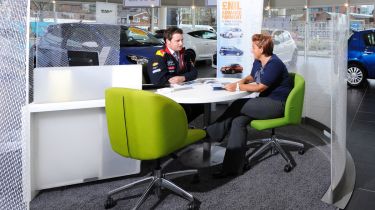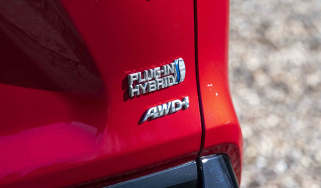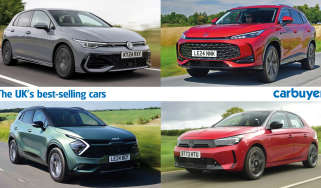New car finance explained
Our guide to car finance deals will help explain car credit and could save you money

Car finance has become the most popular way of buying a new car. Around two million new cars are sold in the UK every year, and more than 90% of private buyers use PCP or lease finance.
It’s increasingly rare that buyers will own a car outright. The statistics show that car buyers want to drive the best car they can afford, and the vast majority of buyers can afford a better car if they pay for it monthly on PCP finance rather than all at once. Car finance can be difficult to understand if you’ve not used it before, so it’s worth getting clued up before you agree to a deal.
In this guide to car finance, we tell you exactly what you need to know and what to expect if you buy a car on finance. We’ll explore the different ways of buying a car and answer questions such as "how do I get out of a car finance agreement?", and "can I give my car back to the finance company?", with a handy explanation of finance terms at the end.
The main types of car finance
There are three main types of car finance: Personal Contract Purchase (PCP), Hire Purchase (HP) and Personal Contract Hire (PCH). You can find out more about them by clicking on the links. Read our guide to GAP insurance, too. This helps ease the financial pain should your car be written off, so is well worth considering.
You can finance a car such as a Ford Fiesta for as little as £80 a month. Even a smart, new city car can be less than £100 a month and that’s with a small deposit. Visit our sister site, buyacar.co.uk to see examples of thousands of finance deals on new and used cars.
Personal Contract Purchase (PCP)
Personal contract purchase is the most popular way to ‘own’ a new car. We say ‘own’ because in fact you won't own it until you pay on optional final payment at the end of your finance contract. This figure, technically known as the Guaranteed Minimum Future Value, or GMFV, is what the finance company calculates the car will still be worth at the end of the finance period. It's sometimes referred to as a 'balloon' payment.
That figure isn't actually covered by your PCP payment contract, and this is why the car remains property of your finance company until the GMFV is paid. You are, however, the registered keeper of the vehicle throughout the term of your finance agreement.Depending on the terms of the PCP, you may or may not have to put down a deposit but you will have to make fixed monthly repayments. These may or may not include interest. If they include interest it will be charged on the entire invoice amount, after your deposit has been deducted..
At the end of your contract, after a fixed number of payments have been made, you will have three choices. You can either return the car to the retailer and walk away, or pay the GMFV balloon payment to to own the car outright. Alternatively, you can use the difference between the GMFV and the actual value of the vehicle at the end of the contract to contribute towards the deposit on a new car.
The last option is the most popular, but it’s worth remembering that the gap between the GMFV and the current value of the vehicle isn’t equity, even if this is the term the dealer uses. Any difference is down to you paying a little more over the duration of the contract than the car is worth, so trading into a new model allows you to capitalise on the difference - you can’t claim it back if you decide to leave the deal.
One of the reasons PCP deals are popular is that they allow you to tailor the package to your needs: the bigger a deposit you put down and the longer the term of the agreement, the lower the monthly payments will be.
The disadvantage of PCP deals is that, while the monthly payments tend to be quite low, the balloon payment at the end can be quite high, and this could be an obstacle if you want to own the car outright. As with most car-finance packages, you don’t own the car if you buy it using PCP: it remains the property of the finance company until you’ve paid it off entirely. PCP deals also come with mileage limits: exceed these and you could be hit with a big bill at the end of the term.
Hire Purchase (HP)
Hire purchase cars are bought in a similar way to cars purchased on a PCP: after you’ve chosen the car you want, you put down a deposit and agree to make monthly payments, over a fixed term. These monthly payments tend to be higher than with PCP deals. That’s because you’re paying for the car itself, rather than just its depreciation.
Once you’ve made your final payment at the end of the HP agreement, you’ll own the car outright, with no balloon payment. Although the finance company will own the car until you’ve made that final payment, some people prefer HP to PCP, as while the monthly payments are higher, there’s no balloon payment at the end to make before you own the car. Customers also like the idea of making payments towards ownership of a car, rather than buying themselves into what often becomes a rolling contract with PCP deals.
Like PCP deals, HP agreements are arranged by the car dealer. The car can also be taken away from you if you fall behind with your payments. HP agreements usually require a 10% deposit and monthly payments and interest rates are fixed when you take out the policy.
Personal Contract Hire
‘Hire’ is the operative word here: Personal Contract Hire (PCH) agreements are long-term rentals. You never own the car outright, and at the end of the term you simply hand it back, with no option of buying it outright.
Personal Contract Hire can offer a cheap route into driving a brand-new car and the monthly payments tend to be relatively low, as you’re not putting money towards purchasing the car or paying off its depreciation, just renting it.
Like PCP contracts, PCH agreements require that you get the car serviced on time, although package deals can make this an affordable obligation. Unlike PCP contracts, Personal Contract Hire doesn’t offer you the option of buying the car outright at the end of the agreement – nor will you be able to put the car towards the deposit on a new car: you simply return it to the dealer at the end of the contract hire period.
Cash or credit cards
In an ideal world, we’d all pay for our cars outright, using cash or a debit card. Because new cars tend to cost many thousands of pounds, however, this isn’t an option for the vast majority of car buyers.
Some people choose to pay for their car with a credit card, but it’s an option we strongly advise against. Unless you have access to a 0% interest credit-card deal and either pay off or move the debt quickly, you could end up paying far more than you need to. Car finance deals have much lower interest rates than credit cards, which are a notoriously expensive method of borrowing money.
It’s also worth remembering that because dealers tend to receive commission from finance companies, buying a new car with cash or card can actually give you less haggling power.
Personal loans
As the name suggests, a personal loan is a loan you arrange yourself, typically through a bank, building society, the Post Office or an online lender. You sign a contract agreeing to the monthly payments and interest rate, before being given the loan as a lump sum. This can then be used to pay for a car outright.
Personal loans can be secured or unsecured: a secured loan requires collateral, usually in the form of your house. If you fail to make the payments, the lender can repossess your house before selling it and using this to repay the loan.
An unsecured loan doesn’t require collateral. The lender makes an assessment of you as a borrower before agreeing to lend you the money. Unsecured personal loans tend to require that you have a good credit record and their interest rates tend to be higher than those on secured loans.
Personal loans generally have higher Annual Percentage Rates (APR) than the financial packages offered by dealers, making them a more expensive way of borrowing money. If you use a personal loan to buy a car, however, there’ll be no restrictions (such as mileage limits) on how you use the car, as you’ll own it outright.
Logbook loans
Logbook loans are a high-risk, high-cost method of using a car you own as collateral against a loan. In return for lending you money, the loan company takes your car’s V5C document – commonly known as the logbook. This means the finance company essentially owns your car until the loan is repaid.
Logbook loans are easy to arrange via online or high-street lenders and typically allow you to borrow up to 50% of the value of your car. Most run over an 18-month period and their APR rates tend to be extremely high: lenders can charge as much as 400%. This means if you were to borrow £1,500 against your car, over 18 months you’d repay £2,750 in interest alone. If you fall behind on the loan repayments, the lending company will repossess and sell your car to pay off the loan.
How do I end or pull out of a finance agreement?
As with any contract, you are bound by the conditions of a car finance agreement, and it's often difficult to end a contract before it comes to an end. If your circumstances change and you need to cease payments, one option that might be open to you is Voluntary Termination (VT).
This depends on you having paid at least 50% of the balance due, and on the car's mileage not exceeding that stipulated in your contract. For example, if you had entered into a three year, 10,000 mile per year finance contract, to end the contract after 18 months your car would need to have covered 15,000 miles or fewer. Your finance company will be able to advise you of your options, depending on your payment history and the amount outstanding.
Another option is early repayment, and finance companies can impose their own rules when it comes to differing from the terms of your contract. You can request a settlement figure from your lender, and it is this figure that must be paid, with the addition of any fees, in order to end your contract early.
Selling or part-exchanging a car on finance
The first rule to remember is that it's illegal to knowingly sell a car that has outstanding finance against it. Unless the finance contract has been completed, the car isn't yours to sell. It is possible, though, to part-exchange a financed car against another, but it can be an expensive option.
When part-exchanging a car that has an active finance contract against it, the dealer will need a settlement figure from your finance company, and this figure will be deducted from the part-exchange value of your car. If you've only recently begun a finance agreement on a new car, though, it's possible that you may owe substantially more than the car is worth.
In this situation, you'll have to pay additional money to settle your existing finance before embarking on a contract for another car. This payment comes in addition to the deposit you'll need to lay in order to achieve your ideal monthly payment on the new car. For this reason, we recommend against buying a car on finance if there's any likelihood that you'll want to change cars in the near future.
Car finance terms explained
APR (Annual Percentage Rate) APR is a realistic calculation of how expensive a finance option will be. Unlike a simple flat rate of interest, APR takes into account all associated costs and fees.
Deposit contribution Some manufacturers offer contributions towards your deposit on a new car to incentivise customers. These range from a few hundred to several thousand pounds and are normally only offered for fixed periods of time, much like a sale. You usually have to sign up for specific financial packages to qualify for a deposit contribution.
Excess mileage If you lease a car or use a PCP package, you’ll usually be restricted to a certain mileage during the agreement. Exceed this and you’ll have to pay several pence for every mile you’ve gone over the limit. Mileage limits are there to guarantee the value of your car when you return it, or trade it in, as cars with high mileage are worth less money.
Gap insurance GAP – or Guaranteed Asset Protection insurance – makes up any shortfall between the value of your car and any loans taken out against it in the event it’s written off. Standard insurance policies tend to under-value cars in the event of a claim; GAP insurance protects you from any potential losses. GAP insurance policies from third-party sellers can cost as little as £100 over three years, although dealers’ policies can be more expensive than this. Our guide to GAP insurance explains the different levels of cover available.
Guaranteed Minimum Future Value (GMFV) When you buy a car using PCP, the dealer will guarantee that at the end of the PCP term, the car will be worth a minimum agreed value. This protects you from any unforeseen drops in value. GMFV also means you know how much the ‘balloon payment’ will be at the end of the PCP agreement, should you wish to purchase the car outright then. GMFV tends to be a conservative estimate of the car’s likely value and many car buyers use the resulting equity toward the deposit on their next car.
Zero percent or 0% APR Car dealers and manufacturers sometimes offer 0% APR to tempt buyers. If you can find a 0% APR deal for a new car, you’re onto a good thing. A car dealer might typically offer 10% APR, meaning borrowing £10,000 will cost you £11,616 over three years. Secure a 0% APR deal and you’ll pay back just the £10,000 you originally borrowed.
Car finance made simple
- Used car finance: top tips
- PCP car finance explained
- HP car finance explained
- PCH car finance explained
- PCP vs HP: car finance options
- PCP car finance on used cars
- Car finance negative equity explained
- How to refinance a car
- Getting car finance with bad credit
- What are guarantor loans?
- What is an HPI check?
- What is GAP insurance?
- Van finance explained
- Car finance made simple
Recommended

Best car leasing deals 2025: this week’s top PCH offers

Petrol and diesel car ban relaxed with hybrids permitted beyond 2030

Classic car tax exemption: which historic vehicles qualify?
Most Popular
Tips & advice

Car dashboard warning lights: what does each symbol mean?

Electric car charging stations: public networks, charger types, apps and maps







